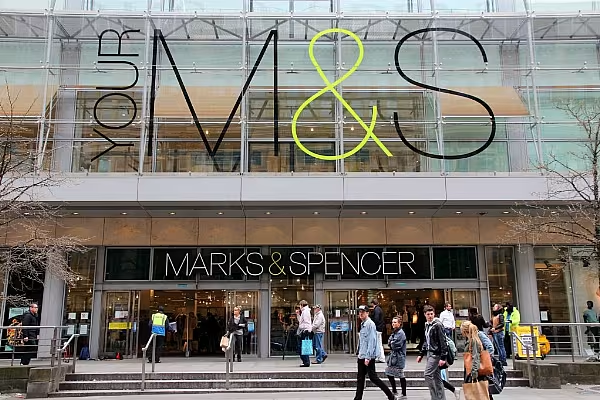The crucial Christmas trading season is shaping up to have been a brutal one for Britain's non-food retailers.
Next Plc's sales gain was welcome, but hardly outstanding. Debenhams Plc, the department store chain, and Mothercare Plc, the parent and baby goods retailer, have both warned on profit.
Next up: Marks and Spencer Group Plc. Whether its report on Thursday shows clothing and home furnishing sales were better or worse than expected, there's one positive that investors shouldn't overlook.
Step Back
M&S has been making a valiant attempt to step away from the discounting mania that's enthralled chains in the U.K. and the U.S. Not only does a retailer holding its nerve on full-price sales protect margins, but it gives consumers confidence in the prices they pay. If shoppers buy a Christmas gift and then see it marked down before Dec. 25, they simply won't do their holiday shopping there the next year.
Saying no to the discounting drug can work. Inditex SA, the owner of Zara, and Next have both been traditionally strong performers, and typically don't cut the prices of garments in their current season.
M&S will report for the period from Oct. 1 through to Dec. 30, and the consensus of analysts' forecasts is for same-store clothing and home furnishing sales to fall by 3.4 percent from a year earlier. That's not exactly inspiring, especially after Christmas 2016, when they rose 2.3 percent.
The company has a habit of outperforming expectations, and that could yet be the case. While its clothing business will have born the full brunt of the warm October -- never good for sales of coats and boots -- demand should have perked up in December, when temperatures dropped.
But even if forecasts for a sales stumble are accurate, investors should look through the bad news and focus on the progress that the retailer has made culling discounts.
The rot set in under previous Chief Executive Officer Marc Bolland. M&S pushed up prices too high and then became reliant on special offers to encourage customers to buy. His newish replacement, Steve Rowe, opted instead for stability at a lower level by cutting 2,500 prices and reining in discounts.
In the year to March 2016, M&S ran nine clearance sales. In the year to March 2017 that fell to six, and will shrink to four in the current financial year.
To be sure, M&S is still running special offers, but they are largely targeted through its Sparks loyalty card. Overall, the amount of its sales made on promotion has come down.
Better Shape
This is the right thing to do. When investors have long forgotten the Christmas numbers and annual profit figures are calculated, those retailers that held their nerve on discounting will be in better shape.
The trouble is, going (almost) cold turkey on offers is painful when it comes to the top line. This can be seen in the slow pace of backing away from sales. According to Richard Hyman, the independent retail analyst, discounting across the board was only slightly less prevalent in 2017 than the year earlier.
Meanwhile, there's always a risk that with much of the high street on sale, shifting gears to encourage shoppers to pay full price just won't work. Mothercare said it had tried not to discount, in the run up to Christmas. But Brits didn't want to spend, and it had to slash prices in its end-of-season sale.
But this cautionary tale doesn't have to be the final word. Mothercare operates in a particularly vicious part of the market. There's intense competition from Amazon.com Inc. and Britain's big supermarkets, which have their eyes set firmly on mother and baby goods.
Other chains should still wean themselves off of their addiction to markdowns. This should produce lasting benefit, no matter how painful in the short term. M&S has much work to do, including closing underperforming stores and trimming its bloated cost base. But its discounting stance is one area where it is on the front foot.
This column does not necessarily reflect the opinion of Bloomberg LP and its owners.
News by Bloomberg, edited by ESM. Click subscribe to sign up to ESM: The European Supermarket Magazine.














